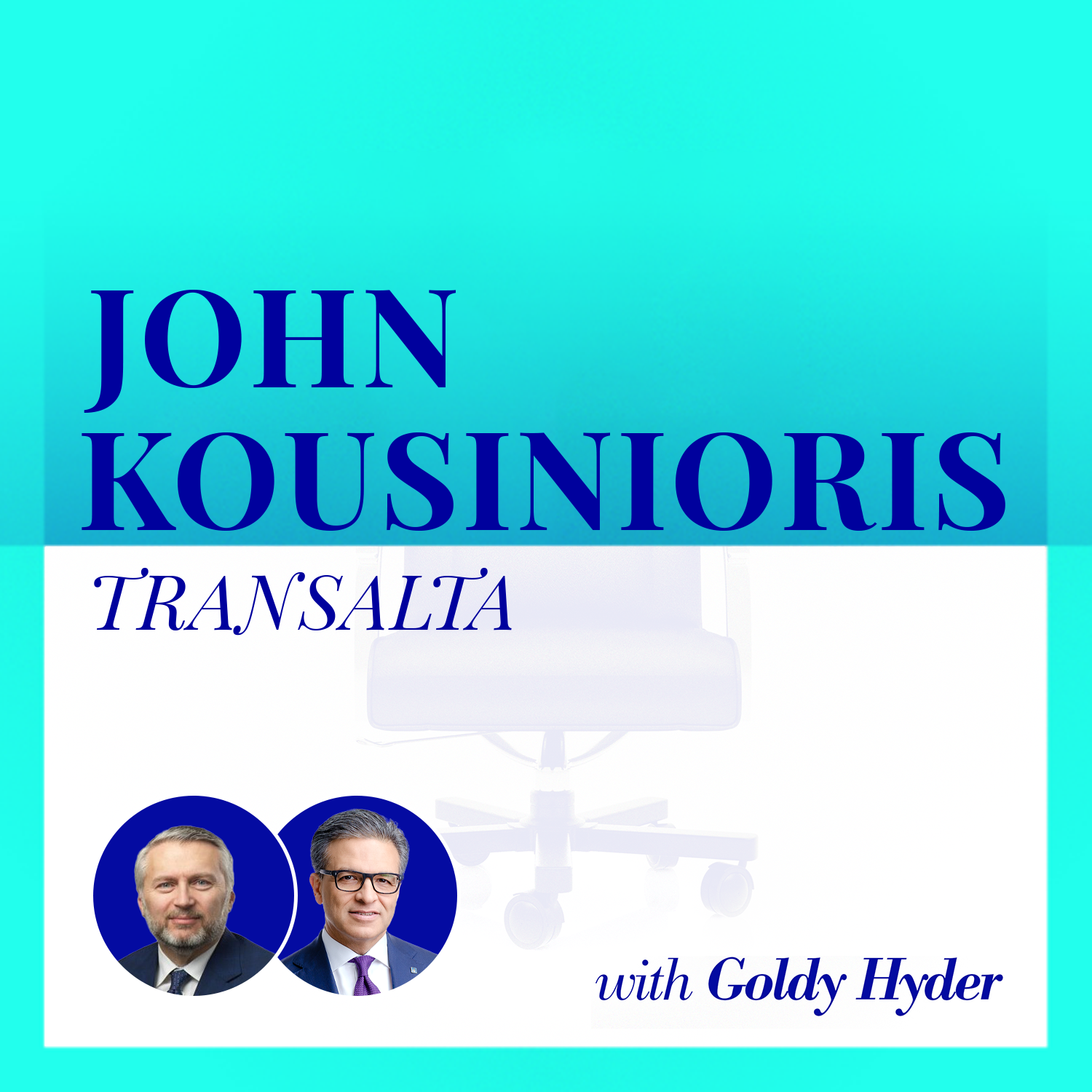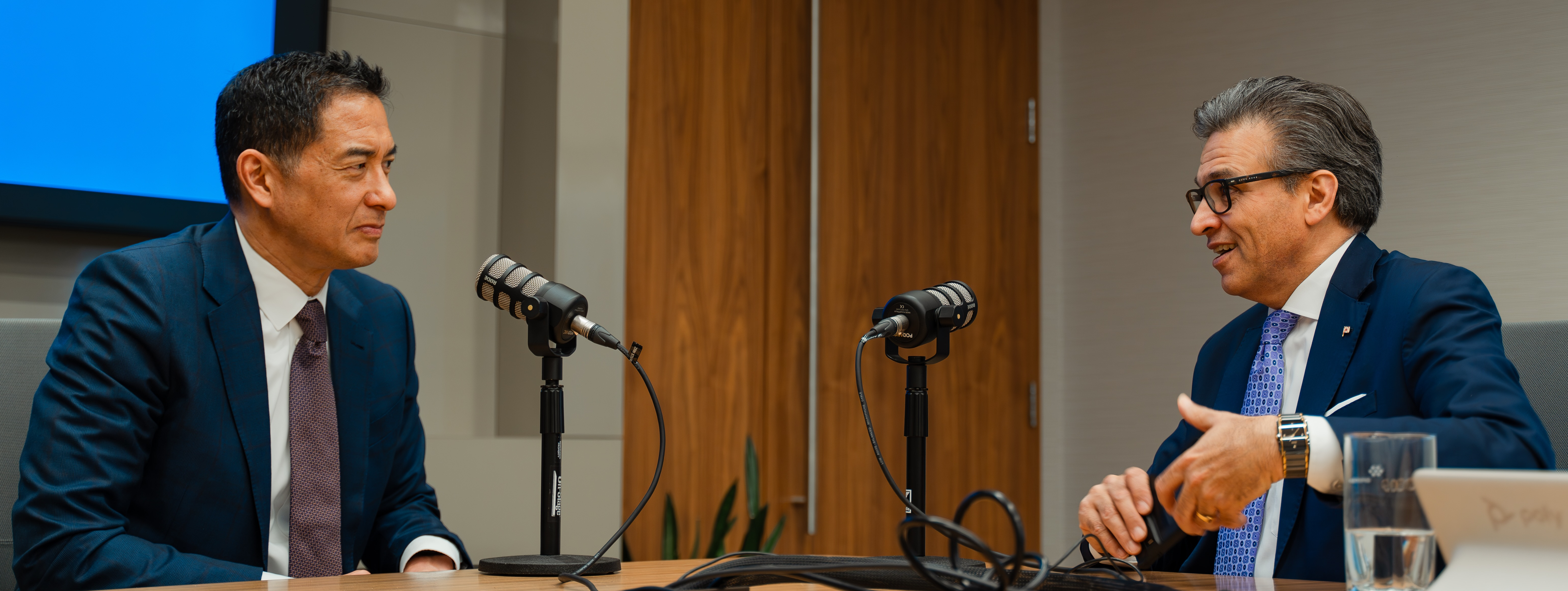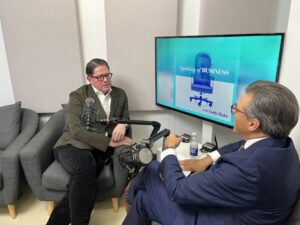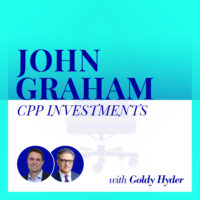John Kousinioris describes 2015 as a wakeup call.
Back then, his company, TransAlta, relied heavily on coal plants to generate electricity for Albertans. The Alberta government had other plans. It announced a phase-out of coal-fired electricity plants and gave TransAlta until 2030 to comply.
Rather than challenging the government’s decision, Kousinioris says TransAlta decided to embrace the change. Over the next six years the company converted all its Alberta coal plants to natural gas, dramatically cutting its greenhouse gas emissions – years ahead of schedule. “It’s been an incredible journey for all of us,” he says.
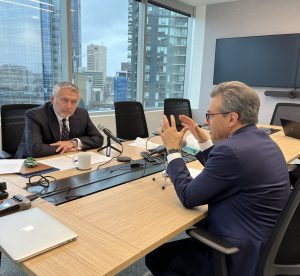
In an interview with Goldy Hyder on the Speaking of Business podcast, Kousinioris, president and CEO of TransAlta, discusses the company’s energy transition and speaks frankly about what it will take to meet Canada’s emissions targets.
“People are intuitively in favour of decarbonization,” he says, but “I don’t think we’ve had honest discussions about what it costs to get there and the challenges associated with getting there.”
In the wide-ranging conversation, Kousinioris also discusses lessons learned from his immigrant parents, his love of motorcycles, and his passion for the Calgary Stampede.
“It doesn’t matter where you came from, what your background is, where you’ve lived. When you’ve got a pair of jeans on, cowboy boots, and a cowboy hat, you belong,” he says.
Transcript
John Kousinioris
We talk a lot about a responsible transition and I often use visual analogs and we think of it in terms of a three-legged stool. It’s all about for us, affordability, reliability, and clean. You’ve got to get all three of the legs right. We spend a lot of time talking about the clean. I don’t think we’ve been honest with Canadians about what the reliability and the affordability components of the three-legged stool actually require. They’re critical.
Goldy Hyder
Welcome to Speaking of Business, conversations with Canadian innovators, entrepreneurs, and business leaders. I’m Goldy Hyder, president and CEO of the Business Council of Canada. I want you to take a moment to think about all the things in our daily lives that require electricity. It makes the lights go on, heats our homes, keeps our food cold, energizes our phones, powers our batteries. Frankly, the list is endless and it’s growing. In our modern plugged-in world, our need for electricity is becoming almost insatiable, but where that electricity comes from matters. Just ask John Kousinioris, president and CEO of TransAlta Corporation. The Calgary-based company operates more than 75 power plants in Canada, the United States, and Australia and is one of the largest renewable power producers in North America. It wasn’t always that way. TransAlta used to generate much of its electricity from coal plants, but after a concerted effort to transform its operations in 2021, TransAlta closed the last of its coal plants in Alberta, resulting in a 50% reduction in its greenhouse gas emissions. How did TransAlta do it? And as the world shifts its energy mix, what can we learn from TransAlta’s experience? I’m at TransAlta headquarters in Calgary to find out. Welcome to the podcast, John.
John Kousinioris
It’s great being here, Goldy. Thank you so much for the introduction.
Goldy Hyder
All right. You’re on the front lines of the energy transition and a few years ago you went from being one of Canada’s biggest carbon emitters to dramatically reducing your emissions. I’ve heard it from you directly, you’re not done yet. But talk to me first about how did you get here? How did you do it?
John Kousinioris
It’s an interesting journey. I think the best way to articulate it would be to provide a bit of a history lesson. In 2015, we had a change in government in the province of Alberta and they made a decision at that point in time from a policy perspective to phase out coal by 2030. Our company had just literally, in the year before I started in the company I think in 2011, had just commissioned a new coal-fired power plant about a $1.5 billion investment, expecting it to run to 2063. So our initial reaction at the time as a company was to fight the decision, was to just oppose it and try to say, “Look, you need the generation that we have. It is a natural advantage. Alberta’s been blessed with a lot of coal. It’s the right thing to do.”
And very quickly, I think what ended up happening was we came to realize that it was a bit of a wake-up call actually. And that rather than challenging or advocating for the status quo, we should actually embrace the change. That resulted in us having a series of discussions and technical work to see if we could take the coal fire-generating units that we had and convert them to natural gas. When you do that, you actually reduce emissions by 40%, 50% per unit.
If you go back to about 2015 we would emit about 40 megatons a year of CO2 in Canada, about 5 per cent of Canada’s – roughly speaking – aggregate emissions. And roll forward to today and we’re kind of in about 10 megatons a year so that’s about a 75 per cent reduction from where we were. So we’ve gone from 5 per cent of the emissions to less than one per cent of Canada’s emissions and that reduction journey that we’ve had, the 30 megatons of emissions that we’ve reduced is about 10 per cent of Canada’s Paris commitment in terms of you know the reduced emissions that our country has signed up for. So it’s been an incredible journey for all of us.
Since 2021, we have gone from having nine coal-fired plants, which we actually operated in Canada. The nine coal plants over time have become three gas plants in Canada. We also had two coal plants in the United States that we ran. One of them was shut down at the end of 2020, the other one will be shut down at the end of 2025 and then we will have no longer any coal-fired generation. At that same time, we began increasing our focus on renewables. We had a significant thermal fleet, coal and gas, and high emissions, but we were also the largest wind power company in Canada and basically the sole hydro company in the province of Alberta. So we were a foot in each camp, so to speak.
Over time what we’ve seen is a waning of our thermal generation and an increasing emphasis on renewables as we move forward. I think if anything, what has surprised us is the speed with which the transition has occurred, which has been remarkable. I think we all underestimated it even today when we think about our gas units, we begin to think about how long they will run, forget the coal units, but the gas units. Even they have a limited shelf life as we go forward. So it’s been fascinating and we’re very, very proud of our emissions reductions. One of the key things we’re focused on from a cultural perspective is a sense of purpose and I think it really energizes me and I know it energizes our employees when they think of our clean energy credentials.
Goldy Hyder
I have to ask, it turns out that it’s even hard to do renewable projects.
John Kousinioris
Yes. Look, it’s getting harder to do renewables projects.
Goldy Hyder
Why is that? I mean, I thought that’s what we’re all trying to do.
John Kousinioris
It is part of what we’re trying to do. We talk a lot about a responsible transition and you’ve heard me, Goldy, talk about this before. I often use visual analogs and we think of it in terms of a three-legged stool. It’s all about for us, affordability, reliability, and clean. You’ve got to get all three of the legs right. Because if one breaks, the stool tips over.
Goldy Hyder
Can we achieve all three?
John Kousinioris
I think it’s challenging. The thing that troubles me about it is we spend a lot of time talking about the clean… I don’t think we’ve been honest with Canadians about what the reliability and the affordability components of the three-legged stool actually require. They’re critical. I’ve told policymakers, “If you do the transition in a way that is overly expensive on people or creates blackouts or brownouts in terms of what we’re trying to do, people won’t be with you.”
Goldy Hyder
Yeah, I suspect you lose support.
John Kousinioris
Absolutely. Business won’t be with you. We can’t do that. That’s why we tend to focus on responsible. In terms of coming back to your question on renewables, it was easier before, I would say. The challenges that we see today run everything from the regulatory right through to the actual execution and maintenance of a project. For example, on a wind farm, the time it takes to get it permitted is longer. It used to take months, it can take well over a year now. The time it takes to get into the queue to make sure that you’ll have an interconnection to transmission can take multiple, multiple years.
In the United States we operate, as you pointed out at the beginning in Canada, the U.S., and Australia, four years may not be an unusual time period for you to actually get in the slot that you need to move forward. The costs of executing projects are significantly higher. I would say a wind farm today costs 30 per cent higher than it did even three or four years ago. Opposition from people in typically rural areas where we tend to site these plants or facilities has increased pretty dramatically I would say-
Goldy Hyder
What do they say? What are they opposed to?
John Kousinioris
Well, a lot of folks… Well, you see the renewables pause that just occurred here in the province of Alberta that was actually quite responsive. I think the government was responding to concerns that people had about… I think really three major concerns and they’ve tried to address all three. One of them was viewscapes. I think a lot of people driving down in parts of southern Alberta, southwestern Alberta, it’s not like you see one or two turbines. You see hundreds and hundreds of turbines. The landscape is changed, it’s altered.
For some of the landowners, it’s not a big deal, they get the rental payments required for being there. But for people that have lived there for multiple generations, other communities, visually, it’s an issue for them. In many cases, the resource is best in areas of particular natural beauty. I mean the Foothills, areas approaching the Rockies is… The wind patterns come in over the Rockies and provide you the best resource but in a place that also has natural beauty. So it’s becoming more challenging.
If you ever had a chance, I remember years ago taking off from the airport in L.A. and you typically take off to the west and you’re into the Pacific and planes typically go north and you’re following the coastline. If you happen to be seated on the east side of the plane, so on the right side of the plane, as you go out and you look out your window, it’s actually staggering. There is an area probably about 20 minutes flying time north, northeast of Los Angeles – Tehachapi and the like, you see lakes of solar panels like lakes. It’s not like one or two, it’s literally lakes of solar panels.
You look out into the foothills as you see the Sierras are coming out there and on every sort of ridge there are wind turbines and not one or two, we’re talking thousands. There’s no free ride here. There’s a visual impact that I think is real. Everything from permitting to finding the people to actually build the projects which are typically in remote locations, to servicing them, to making sure that we get the reliability from the supply chain and that it’s reliable. From the moment that you envision a project to the time that you actually commission it, the timeframes are elongated, the costs have increased. I think, rightly so, the sensitivity that the communities have around it, you have proponents because they like the tax revenues and the income that it leaves in the communities, but not everybody is aligned.
Goldy Hyder
On the upside, we’re having these conversations now.
John Kousinioris
Finally.
Goldy Hyder
So maybe there is some benefit to education and getting people to realize that it’s going to be hard to make all three of these legs of the stool work.
John Kousinioris
And it’s going to take longer to go from where we are to where we aspire to be. It’s interesting. I was at a meeting in Oslo about two years ago. I was part of Team Canada and every few years there was a meeting of electricity industry representatives from the European Union, Canada, the United States, Australia, and Japan. What was interesting was the head of Electricity Canada at that point put up a slide and it simply had the number of days left until 2030 when we had a net zero targets.
It was hilarious because everybody, all of the representatives of the various groups, they all chuckled. The practical reality of doing what we notionally aspire to do within the short and increasingly short, every day goes by gets shorter, timeframe. Just the practical reality of getting there, it was stark. I mean it was a very powerful slide. Actually, we didn’t need to say anything else. We just needed to put up the… There’s X number of days left. We’re going to get there.
Goldy Hyder
Do you think Canadians themselves are more tuned into this reality now? Because I mean they’ve had so much come at them. And I think we all agree with the objectives. We’re just, I think trying to make sure that people understand what the facts are and that there is a cost to all of this.
John Kousinioris
I think there’s still a gap, I would say. And look, every industry, every business has complexities. So I’m not suggesting that our industry is any more complex or difficult, but it’s a public good. It’s interesting when you began our conversation, you talked about the things that electricity does. I speak in a very similar narrative to our employees. We talk about powering and empowering communities. When people ask me what I do, I don’t say I work for a power company. I say, “Look, we provide the essentials of life, businesses, schools, hospitals.” That’s like without power today-
Goldy Hyder
Airports.
John Kousinioris
… you’ve got nothing. From heating your home to keeping the lights on when somebody’s in the middle of a life-and-death surgery in the hospital, it enables everything that we do. That’s a very powerful thing that we try to do. I think people understand the importance of electricity. I think people are intuitively in favor of decarbonization. I think they accept that it’s a laudable thing to do something that we should all be trying to do. I don’t think we’ve had honest discussions and look and we’re as much to blame the industry as much as government is certainly about what it costs to get there, the challenges associated with getting there because I’m always reminded that it’s easy to say, “Yep, I’m in favor of decarbonization.”
But what’s interesting is there’s often a second question that is asked, which is, “Well, how much are you willing to spend personally?” Whether it’s a business or an individual household. That’s when the wheels all fall off the car, right? Because people aren’t willing to spend what it takes.
Goldy Hyder
There actually was a survey done of Canadians where Canadians said, “Look, this is an important issue to me and I’m willing to put a couple of hundred bucks on the table for it.”
John Kousinioris
It’s not going to do it.
Goldy Hyder
Couple of hundred bucks for a year.
John Kousinioris
I know it’s not going to do it.
Goldy Hyder
It’s not going to do it.
John Kousinioris
You’re not saying per month, right?
Goldy Hyder
Exactly.
John Kousinioris
Times are expensive. It’s not like people have a ton of cash sitting around. It’s challenging.
Goldy Hyder
I’ve heard you say that investors are in many ways ahead of governments when it comes to the transition. Explain to me what you mean by that.
John Kousinioris
When we look at, if I can use financial speak, the multiples that companies that are more pure play renewables are, when I look at the pools of capital that are available for renewables development globally and storage, it’s high. When I look at what companies do when they procure clean power to drive their operations, particularly, those companies that have what I would call a significant interface with consumers where there is an imperative to have proper clean credentials in terms of what you’re doing. If you’re Nike or if you’re Microsoft or you’re Amazon or you’re a company like that, or even a food service company that’s actually providing those goods and services to consumers, there’s an expectation.
I think it goes without saying that you need to provide clean energy to those kind of people. So I think they’re ahead of the curve and I think government is reacting and trying to figure out what to do, whereas industry is already doing it. I mean we look at the renewables procurement that has occurred here in the province of Alberta, it’s been staggering. It was done without any particular government policy to drive it. It was in response to a demand largely among industry plus pools of capital to actually drive out the build and procure greener power that was necessarily-
Goldy Hyder
Supported by shareholders obviously, or we wouldn’t be doing it.
John Kousinioris
Absolutely. But I think what’s happened is… Again, we talk about the great things of our industry, there is some dirty laundry as well. I’ve actually seen the pendulum shift back a little bit. There was a lot of exuberance around it, I would say. I think when you get down to the hard cold reality of executing, did you build the project on time, on budget? Did you actually create value for your shareholders in terms of holding the returns that were expected on a go-forward basis? Are the returns on a risk-adjusted basis appropriate for the risks associated with the clean projects?
I think the industry needs to get better. I think we’ve done just the passing grade, I would say, on that. I think people are actually seeing better returns in natural gas by our generation. We’re seeing I think more of a balanced approach going forward where I think people are recognizing that we’ve got to look at the transition holistically-
Goldy Hyder
In a portfolio way.
John Kousinioris
That’s right.
Goldy Hyder
Speaking of gas, what role do you think natural gas is going to have to play in Canada?
John Kousinioris
I think it depends on the jurisdiction. Look, my personal view is that natural gas is going to be around, it’s going to play a considerable role for many, many years to come.
Goldy Hyder
Decades.
John Kousinioris
I agree. It depends on the jurisdiction. If you’re in Quebec or you’re in British Columbia or Manitoba and you’re blessed with incredible hydro resources, you’re very fortunate. Ontario’s got a lot of hydro too, and it’s got the nukes as well. But when you’re looking at a jurisdiction like Alberta where 80-plus percent of the generation came from natural gas, shifting it to something that is cost-effective and reliable, it’s hard to find something that’s better than gas right now.
I think the renewables will continue to come in, but I think there will continue to be a role for natural gas to create that reliability part of the stool, the three-legged stool that we talked about for a considerable period of time. In part, because I think Goldy, it isn’t clear to me what are the technologies that are going to on a cost-effective way trump that generation in the 2030s.
Goldy Hyder
You read my mind on the next question, which is do we actually have the tools in the toolbox that are going to get us to these targets we’re setting, or are we actually assuming, banking on, counting on, innovation and new technology to help us get there? We don’t even know what we’re talking about.
John Kousinioris
No, we don’t. It’s interesting. Shortly after I stepped into the role, I developed a new technology team in our company, and look, we’re not big enough that I can have 50 people running around in white lab coats doing R&D, but we needed to be… One of the things we learned was that your technology, i.e., coal in our case can be made obsolete quickly. Whether it’s because of a technological breakthrough or because of government policy, it can go, it can be very, very fleeting in terms of where you are. So it was important for us to spend the time scanning to see what will be the technologies, not so much in the 2020s, but in the 2030s and beyond.
So the kinds of things that we’re looking on, pillars for our company, we’re looking at hydrogen. We’ve made an investment in a company that is looking at processes to develop hydrogen at site through pyrolysis that we might have a fuel that would be cost-effective that we could run. We made an investment in Energy Impact Partners, which is looking at their deep decarbonization funds. Our team is able to work with their scientists and experts with a view to looking at what’s the latest and greatest in everything from carbon capture technologies to storage to fusion to fission. We’re literally looking at everything and saying this is the state of play. We’re doing a little, we’ve got letters of intent with various people, and we’re exploring the possibility of repowering, or what new technologies may be there. I think it’s critical, but I can’t tell you today that it’s this or that. We’re trying to keep a pretty broad net.
Goldy Hyder
In that backdrop, you still have a workforce and you employ a lot of people. An energy transition you would think implies that there will be a workplace transition as well. So give us a sense of the impact that even just moving away from coal had on your workforce and what did you do about it?
John Kousinioris
I’m glad you asked that. This is something that I’m actually pretty passionate about, Goldy, and something that I don’t think gets talked about enough. We used to run the largest open-pit coal mine in Canada. The reason we had coal plants was we had an abundance of coal. So you put the plants on top of the… Literally, on top of the resource. That’s the case for with us in Alberta. It’s no different in Saskatchewan, it was the same in Washington State. That’s what the resource was. We used to have, at one point, I think over 2,000 men and women working in our coal mine, many for multiple generations, and we’re down to 50 people doing reclamation there.
We used to have one of our coal plants in Centralia, Washington, which we shut down, resulted in over 100 people losing their job. Our company has probably never performed better financially as we have today, and we’re doing it with about half the workforce that we had before because of the impact, not just the people, but communities that have occurred by pulling back of some of the types of generations that we’ve had. The types of generations that we’ve pulled back on were employee-heavy generation.
We often get into these discussions like if you had apples to apples, a coal plant, a gas plant, a wind farm, a solar plant, 200 employees in a coal plant, maybe 50, 60 employees in a gas plant, maybe 10 employees in an equivalent wind farm. By the way, we’re going down in reliability now. Then with solar farm, maybe three. We chuckle about it sometimes and maybe it’s some goats actually to eat the grass and literally keep it in place. There are jobs that will be created for sure in terms of the construction and the build-out that occur, but it’s not the same, and the compensation received isn’t the same either. It’s complicated. When you hear people talk about it-
Goldy Hyder
Can you help them though? Can you help them with training?
John Kousinioris
We do. I’m glad you asked that. We often hear people talk about a just transition. It doesn’t feel very just I can tell you for those men and women because they were just doing their jobs and they’ve done it for many, many years and they worked hard in a challenging environment. When we were in the process of transitioning our plants from coal to natural gas, significant employee impacts up at our Sundance and Keephills. This is just west of Edmonton, about 45-minute drive west of Edmonton. We did everything from job fairs, career days, assessing people like, “Do you have expertise in a particular area and you’re missing a ticket that should you get it to see if you can get employment elsewhere?”
It’s interesting, sometimes with government you get the sense of, “Look, we’ve got programs that provide income support to these people as they transition out.” What we like to remind them is, “Yeah, but they don’t actually want that. They want a job.” The one thing I would say we’ve been fortunate about Goldy, and it’s literally pure luck, is that our workforce in some of the facilities that probably had a shortened life tended to be a little bit older. So we were lucky that a number of the men and women were approaching or near retirement age.
With a bit of financial incentives and whatnot, it was just time for a lot of them to be thinking about it. But if you were 30 and you’d been working at the facility for only a few years, that was not a great answer for you. In some cases some of them have to go elsewhere to find the work that they need, particularly, in the rural areas. Luckily enough, in Alberta, there’s the oil sands and other places that people can go, but it’s challenging.
Goldy Hyder
Well, look, we’ve covered a lot of ground and I spent a lot of time because I think there is a curiosity and an interest and you bring frontline real experience about the challenges and the opportunities that this transition represents. Thank you for sharing that. But part of our podcast is also about talking about leadership, about your own story, and so forth. I want to pivot to that if I may. Now were you born in Canada, or were you born in Greece?
John Kousinioris
I was born in Calgary.
Goldy Hyder
Born in Calgary?
John Kousinioris
I’m a relatively rare these days, native Calgarian.
Goldy Hyder
So you’re born in Calgary. Your parents came to Canada from Greece. My parents moved to Calgary from India where I was actually born, I’m wondering, the importance of the experience of our parents and the values that they imposed on us going back, you and I probably similar age, to grow up in that time.
John Kousinioris
I think you’re much older actually.
Goldy Hyder
Am I?
John Kousinioris
Oh, yeah. For sure.
Goldy Hyder
Maybe that gray hair that you wear.
John Kousinioris
Look, I suspect our stories are somewhat similar in that. Look, family… For my brother and I, there’s two in the family.
Goldy Hyder
Ditto by the way. Just me, my little brother.
John Kousinioris
The two. Again, a little brother. So I was the oldest one, although he’s smarter than me, he’s just retired at 57, so he is doing something better than I am. But there was a narrative in our family about leaving Greece, which was a pretty hardscrabble existence. I mean, both my mom and dad were from a rural part of the country. My grandfather had something like eight acres of land that he was going to have to split between four different kids. I mean it was very agrarian, not a great life. It was all about leaving… As much as they loved Greece, it was literally all about opportunity, leaving to get to a place with new horizons that could actually help their children.
That was a narrative I have to tell you in the kitchen table from for as long as I can remember, it was the notion of sacrifice like, “We left friends, family, the cultural elements to come to a place that we feel comfortable.” My parents are passionate. They both are still alive, which is great. My dad turns 94 this year. They’re passionate Canadians whenever they travel… They’re getting a bit old now. Whenever they travel back to Greece, they find it weird there. It’s like they can’t wait…
Goldy Hyder
Canadian.
John Kousinioris
It’s nice to spend time visiting family. It’s like, “Oh, my God, thank God we’re on the Air Canada plane.” My dad wants to see what happened to the Calgary Stampeders as they’re on the flight back home. But there was always a narrative around, “We left so that you guys could have a better life,” my brother and I. There was almost a responsibility in a weird sense.
Goldy Hyder
Expectation.
John Kousinioris
An expectation that you needed to-
Goldy Hyder
Don’t screw it up.
John Kousinioris
Yeah, don’t screw it up. That was everything from school to work. Speaking of work, my brother and I… Me and my parents, like many Greek families were in the restaurant business. So I remember being 11 and working the cash register at the restaurant and my brother was the same thing. You began working at a very, very young age in the family business, and that was an expectation. I sometimes wonder, honestly, when I think of my kids today, I’m blessed with three kids. I’ve got a 25-year-old son and two young daughters, 11 and 8. I’m pretty soft, I got to say with them. It doesn’t mean that my parents didn’t love me. But it was just the narrative was different. The expectations I think were actually higher and I think we were exposed to work and the expectations of work at a very early age.
Goldy Hyder
Do you worry about your kids having it easy and… It’s going to be tough for them, let’s be honest.
John Kousinioris
It’s interesting. I think you and I have talked about this before. I remember I used to work in one of the national law firms. This is years ago now, somewhere between 15 and 20 years ago, they brought in a company that was going to coach some of the lawyers in the company. The idea was we will coach our better performers and some of our weaker performers, and we’ll lift the performance of the company as a whole. I remember speaking to the woman that was doing the coaching and she just looked at me and said, “John, your journey isn’t unusual and almost predictable just because your parents…” Goldy, I think some of the same things would’ve applied with you. She goes, “The real challenge is your kids.” I said, “What you mean?” She goes, “Well, you guys, you fix everything for the kids.”
Goldy Hyder
We prevent them from failing.
John Kousinioris
Totally.
Goldy Hyder:
You and I failed a ton, I’m guessing.
John Kousinioris
Always, right? I think the value of failing is greatly underappreciated and I think it’s massive. It’s an interesting point. So something my wife and I talk about from time to time, maybe we should just expose them a little bit more and let them flounder.
Goldy Hyder
How is it that you’re able to help them knowing this? You know that you’re making life a little easy for them, but surely they’re coming to you for advice, dad, mom.
John Kousinioris
My daughters, don’t, they just roll their eyes at me, and rightly so, which is pretty much par for the course. I mean, I do have these discussions with my son from time to time. What’s more powerful though I think, Goldy? I don’t know what it’s like with your family. It’s whenever we have a family dinner, which we try to do at least once a week. We’ve been blessed. My parents live in the Calgary area. My dad will tell them stories and to the extent that he can capture their attention for a bit before they watch TV or run off and steal one of our iPhones to play with, it’s pretty powerful I think coming from him because he talks about his own hardships growing up and they can’t even relate.
Goldy Hyder
They can’t relate.
John Kousinioris
It’s like World War II went to grade six kind of in a one-school classroom, not great. He goes, “We learned how to sound out a bunch of words, the alphabet and multiplication, division, addition, and subtraction. That was it. You were off.” I am not sure.
Goldy Hyder
Well, let’s talk about your own leadership journey. You and I met long before you got this job, actually you weren’t even in this company. You were at the law firm you mentioned and here you are, the CEO of TransAlta. That was what all planned, or how did you end up here?
John Kousinioris
None of it was planned. I received a call one day from a headhunter who said, “Hey, John, we’d like you to meet with the CEO of a company. They’re looking for general counsel.” I actually said, “No, I don’t want to meet.” I’m good where I am. I was a corporate department head. I had a pretty busy practice. I wasn’t interested in making the transition at that point. It was almost like, “Do me a favor.”
Goldy Hyder
What have you got to lose.
John Kousinioris
Yeah. We’re just trying to get some candidates. By the way, it’s a bit of a different company. It’s TransAlta. It’s a power company, it’s a company with a long legacy in Alberta, which was interesting. It wasn’t oil and gas, which typically in Calgary would’ve been more that way. I said okay. I went and I met with the CEO and I remember it was Dawn Farrell who was my predecessor, who was a great leader for our company and managed to navigate-
Goldy Hyder
I have a great podcast with her as well as a matter of fact.
John Kousinioris
You know what? I haven’t heard it and I will make a point of listening to it. She was running late and I remember sitting down with her. I was the fourth of four interviews she had done that afternoon, and she goes, “So tell me why you want to work for TransAlta?” I looked at her and I said, “Whoa, I’m not sure I do. Why should I work for…” She was quite taken aback. She’s like, “Oh, my God.” What should have been a 45-minute conversation, I remember her calling her husband and I think they were flying to Vancouver and said, “Look, I’m going to be a little bit late.”
We just talked about culture. Because the law firm I was at had been on a cultural journey and always prided itself on having a high esprit de corps. So we didn’t talk about my skills or work or the company. We just talked culture and what it means to an organization, how it moves forward. That was the first time this whole journey began, I would say. Then I finally came to the realization that I didn’t quite have the same spring in my step as I did at the law firm and is this all there was? Sometimes you got to stand on the edge of a cliff and jump. So I did.
I came over as the chief legal officer of the company and over time became an officer at large really for Dawn and then chief growth officer, which was a bit of a misnomer. Because I actually ran our renewables and gas business too at that title, then chief operating officer, and then I became the CEO just a bit over three years ago. So none of it was remotely preordained, none of it was within the realm of my even consideration until Dawn candidly planted a seed some number of years after I’d been in the company. Then it became a bit of an exercise in rounding out my experience but I love going in the field. That’s one thing I did at her encouragement. Spent a lot of time climbing turbines in our gas facilities in all of our jurisdictions we do-
Goldy Hyder
You weren’t the lawyer when you were there?
John Kousinioris
No. We do culture tours in our company. We have been on a journey to really emphasize three core tenants, which are results, learning, and purpose. We literally show up and it’s just… I’ll make a few remarks about things that are going on. Then it’s just an open, our employees are there from whatever facility, and it can be as little as 5 to as many as 100 at Alberta Thermal. It’s like whatever question you want to ask, just go. I love it. I love connecting with our employees. I think we owe them candor and sometimes we deliver really hard messages including about the viability of the business units that they’re in and what we’re doing, the challenges we face from a regulatory perspective, from a policy perspective, all of that. Candidly, I think we have a responsibility, we owe it to them.
You’d mentioned leadership and whatnot. I mean, I think for me being the chief operating officer during the COVID pandemic, there was no playbook for us. I remember at that time trying to figure out what’s the framework through which we’ll make decisions. I had actually about a year and a half before refreshed or revamped our five values, respect, integrity, safety, and we talked about sustainability and innovation. It was those values of particularly the safety, respect, and integrity that drove our interactions with our employees. That was a bit of my journey, to be honest, was dealing with our employees. I started emailing every day. I would email a dozen of our employees like, “Are you doing okay?”
Goldy Hyder
Should employers do more to educate employees about some of the challenges that your businesses are facing and how it impacts them?
John Kousinioris
Yes. I actually think there’s no downside.
Goldy Hyder
Why doesn’t it happen?
John Kousinioris
Well, I think people do do it. I think you literally have to do it. I think sometimes… Look, I can only speak for my own experience. I think there’s times when you get so consumed by the project or what you’re doing that five months go by and you haven’t engaged people’s … Sure you can do a town hall or whatever, but it’s not the same as sitting down with a group of people and just saying, “Here’s the hard cold reality.” I think some of them don’t want to hear it candidly, Goldy. But I think it’s the right thing to do.
There’s never been a single time when I’ve done it either individually or with our team that I’ve regretted doing it. If anything, it’s always led to discussions that I wasn’t anticipating and were super, super insightful on the part of our employees. So it’s really a two-way discussion. I mean, I understood where they’re coming from better and sometimes it requires challenging them. They’ll make a statement about something that isn’t in fact true. I think leaving that unanswered or unaddressed is inappropriate too. Look, I think we should all strive to do it.
Goldy Hyder
Okay. We’re winding up. I’m going to have some fun moving at the end here with some rapid-fire questions. But before I do, we talked earlier about Canada, the choice of being here. Looking out for your kids, are you hopeful and optimistic about our country?
John Kousinioris
I’m an optimist, fundamentally, I would say, Goldy. When I look at my kids, I’m actually amazed every day. I look at their energy, I think about our educational system, which for all of its challenges is still great and accessible by and large. I look at the resource endowment that this country has, which is everything from our people and the various cultures of people that we have right through to the oil and gas we have to the agricultural products that we produce to the minerals, forestry, oceans, fishing, everything that we have to just the minds of our people and their creativity.
When you think of AI and all the technology that we’re doing and all the great engineers that we have, I think it can’t help but be optimistic. It’s funny, sometimes I get into these discussions and people go, “Our current crop of employees, geez, I’m not sure that they have quite the commitment.” I am like, “No, I don’t think that’s right.” I think we should double down on them. Because there’s never been a generation that’s more numerate and more socially savvy and more technologically savvy and they want balance in their life and I think have expectations of what their employer should have. But man are they pretty productive and can do those things and have seen more of the world than their parents or grandparents who would’ve ever seen it.
That’s a long-winded way of saying I’m fundamentally pretty optimistic and I think you’ve got to take a long-term view and sure every now and then things don’t go as well or we feel we underperform as a country, but I think sometimes we need to get out, look around, and go, “Gosh, it’s a pretty amazing place.” If you consider how old it is, it’s a really amazing place.
Goldy Hyder
I mean it’s an infant in the big picture of the world.
John Kousinioris
Totally. Well, good. Look, we’re in Calgary, which is about 120 years old and has 1.5-million people now and growing like crazy. Who would’ve thought, honestly, which is super sophisticated with people all over the world doing great things?
Goldy Hyder
Well, look, I arrived here in Calgary 50 years ago this August.
John Kousinioris
I told you you’re old.
Goldy Hyder
Yeah. I’m pretty sure Mom and Dad would choose Canada all over again.
John Kousinioris
Ditto.
Goldy Hyder
Okay. Let’s wrap up with some fun. I want to ask you some rapid-fire questions. Here we go. Tell me one cause that you’re passionate about outside of work.
John Kousinioris
There’s actually a couple. One of them is just education generally. I’m the vice chair of Bow Valley College here in town and I cannot tell you how proud I am of the mission of the college and how we help people, everything from advancing their careers in health sciences to giving them micro-credentialing and helping them with pivot education and really oriented, not so much with theoretical education, but much more practical in the job, get people working. I think it’s unbelievable what happens there and that’s something that it’s important to me. The other one is just health generally. My wife has a bit more time than me and she’s on a couple of boards. The one that I think is most impactful is actually the Crisis Center here.
Goldy Hyder
The Distress Center?
John Kousinioris
Distress Center.
Goldy Hyder
I was on that board once upon a time.
John Kousinioris
No, I didn’t know that. I think Amanda’s vice chair. She is vice chair and her term is coming up actually.
Goldy Hyder
I chaired it.
John Kousinioris
Fantastic. It’s unbelievable organization.
Goldy Hyder
It’s an essential service.
John Kousinioris
The amount of work that they do and the amount of people that they touch as an adjunct to that the United Way in Calgary, which I think as you know is a big organization and our company is… We’ve got a giving campaign last year was our biggest year ever. Just helping the community. We’re part of the community. I think if the community in which you live with isn’t a healthy one, that’s a reflection on everybody, I think, in the community. Those are the things.
Goldy Hyder
Great. Thank you. Favorite way to relax.
John Kousinioris
Oh, God. Riding motorbikes.
Goldy Hyder
Okay. For me, I knew that was going to be the answer. So I have another one coming up later. I know you were very involved in the Calgary Stampede and then we’re talking here in May of 2024. What do you love about the Stampede? It’s coming up soon, July.
John Kousinioris
I have a dirty secret to tell about the Stampede. I have a journey with Stampede. When I was, I would say, 18, 19, 20, I was not a Stampede guy. I would say in all honesty, I thought, “This isn’t…” It doesn’t really reflect… It’s foreign to me a little bit. It seemed at that time, little did I know the importance of it, almost hokey, I would say, which is a silly way to think of it. Roll forward to today, and I love everything about Stampede.
In a world where there’s so much convergence, it’s unbelievable when you travel, having something that is unique and actually is… For me, it was just a lack of understanding and sophistication at the time that actually celebrates the history of the place, the cultural elements of taking that American cowboy with the British law and order and putting it together and underpinning the city. The notion of community, the notion of helping people in the community, having the Indigenous component, which is so critical to underpinning where we are today and recognizing that and the influence that it’s had on the city today. I think it’s a wonderful thing.
I mean, the fact that everybody dresses up Western, so it isn’t a peripheral thing, it’s at the core of who we are and seeing people-
Goldy Hyder
It’s a great equalizer.
John Kousinioris
… from all walks of life. Well, it is.
Goldy Hyder
I remember it as a great equalizer.
John Kousinioris
It’s wonderful.
Goldy Hyder
Unity.
John Kousinioris
It is unity. I think it really… I think unity is the best word. It doesn’t matter where you came from, what your background is, where you’ve lived. When you’ve got a pair of jeans on, cowboy boots, and a cowboy hat-
Goldy Hyder
You belong.
John Kousinioris
… you’re part of the tribe here. You know what I mean?
Goldy Hyder
Exactly. Is there a favorite Stampede event in the campus?
John Kousinioris
I’m a rodeo fan. Then my wife rolls her eyes at this. She’s like, “John, really?” So I love it. A secret pleasure of mine is actually sneaking out during the Stampede and seeing the Rodeo in the afternoon. I see what the cowboys-
Goldy Hyder
At least they now know where you are when they listen to this podcast.
John Kousinioris
They know where I am. Trust me, I’ve got my iPhone there.
Goldy Hyder
I’ve done my service to this organization.
John Kousinioris
No, actually, I enjoy it.
Goldy Hyder
You mentioned motorcycles, so let’s end on that. Because I know what a real passion this is of yours.
John Kousinioris
I do love it.
Goldy Hyder
Your best bike, your favorite.
John Kousinioris
Oh, my God. Probably the bike I learned how to ride on. I bought a Royal Enfield Bullet, which is-
Goldy Hyder
I’m supposed to be impressed now, right?
John Kousinioris
No, you’re not. But it’s a bike that… Imagine a 1950-style old-school bike.
Goldy Hyder
Vintage.
John Kousinioris
Very vintage, was a bike that I think it began with the postal service in the U.K., and it evolved not a lot over the years and became defunct and then was bought by a group in India and are now manufactured in India. So it’s the bike that’s most pervasive in India, actually, the Royal Enfield. So I bought one as my first bike. It’s not very powerful, but it’s very raw if I can put it that way. There’s nothing technically advanced about it. It’s not-
Goldy Hyder
Sometimes old is gold.
John Kousinioris
Old is gold. For me, getting on and what’s great about Calgary is you can actually get out of the city pretty quickly and then the city does end. Getting out and riding around on a summer day, just hearing the noise from the engine and being alone, I typically ride by myself. It does clear my head many times when I’m-
Goldy Hyder
Is it therapeutic?
John Kousinioris
It is therapeutic. Interestingly, there are many times when I’m grappling with something, and a framework or a solution or something subconsciously pops in.
Goldy Hyder
Going to sneak in two quick ones, which is-
John Kousinioris
Of course.
Goldy Hyder
… the best trip that you’ve ever taken and the one that you most want to take on your bike.
John Kousinioris
On my bike? Okay. The best trip I’ve taken on my bike was, it’s funny, I’m going again in a week. I flew down to Las Vegas a few years ago, rented a bike, and rode around the Grand Canyon.
Goldy Hyder
Oh, nice.
John Kousinioris
Stopped in various places.
Goldy Hyder
How long would that take?
John Kousinioris
It took me three days and would stop and do a couple of hikes in the canyon and come out. It was fabulous. Until you physically see it… I rode up through Nevada, into Utah, and then through Arizona, and then back again. The desert is really… It’s pretty cool, I would say. The colors are interesting and there’s a lot of life there that you wouldn’t expect. It was beautiful.
Goldy Hyder
Nice.
John Kousinioris
A trip that I’d like to take. I don’t know when I’m going to be able to do this, but I had a buddy and we would always muse about flying to Istanbul, picking up some ratty old secondhand bikes, and riding to Cairo all the way around. This has been a long-standing dream and my biggest fear just given the turbulence in the region is that we’re never going to get a chance to do it. I’m a bit of a history buff, and that’s a part of the world that has a tremendous history. That would be pretty spectacular to see.
Goldy Hyder
Well, look, this company has a great history. You’re adding to it with your leadership. Thank you for taking the time for doing this. We appreciate it.
John Kousinioris
Appreciate it very much. Thank you so much.
Goldy Hyder:
John Kousinioris is President and CEO of TransAlta.
If you would like to hear more of our Speaking of Business conversations with innovators, leaders and entrepreneurs, why not subscribe to our podcast? Search for Speaking of Business wherever you get your podcasts. Or go to our website at the businesscouncil.ca
I’m Goldy Hyder. Thanks for joining us.





